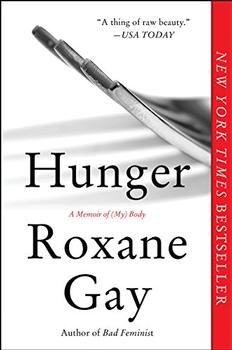Summary | Excerpt | Reviews | Beyond the book | Read-Alikes | Genres & Themes | Author Bio

A Memoir of (My) Body
by Roxane GayIn this penetrating and fearless memoir, author Roxane Gay discusses her battle with body acceptance and PTSD stemming from her rape at age twelve by a group of boys. After using food and weight gain as a defense mechanism, she describes her journey of learning how to trust others, while recounting the myriad physical and psychological obstacles faced by obese individuals.
The first half of the memoir traces Gay's trajectory from being a happy, well-adjusted child to a very troubled young adult, as she was hesitant to seek help or tell friends or family about her rape. Left to her own devices at boarding school and then at college, Gay ate as a form of comfort, and used her weight gain as a way of becoming invisible to men, whom she found frightening after her attack. After quitting Yale and briefly spinning out of control in Arizona, Gay returned to school to get her undergraduate, and then graduate degrees elsewhere. She has since established herself as a talented and successful writer, but continues to be marked by the past. She describes, for example, Googling one of her attackers and imagining confronting him at his place of business on a near daily basis. However, she has learned to loosen her boundaries, to love and accept love in return, has opened up about her trauma, and is finding ways toward better health and happiness – the things she hungers for most of all.
Gay explores aspects of life as an overweight person that are rarely discussed, and these will hopefully spark conversation and greater sensitivity toward some important issues. For example, she speaks lovingly of her family, while wishing they would cease trying to intervene in issues surrounding her weight. She longs to wear bright colors, but sticks with a drab wardrobe so as not to draw attention to herself. Eating in a restaurant can be unbearable if the chairs have arms, and air travel is fraught with anxiety. Overall, she notes astutely, "The bigger you are, the smaller your world becomes."
Gay also discusses the unique difficulties in being a feminist and an obese woman. She recognizes that despite Western cultures' unreasonable beauty and size standards, all women deserve to feel comfortable and confident in their bodies. Yet she does not feel that way herself. "My body is a cage of my own making," she writes, "I am still trying to figure my way out of it." She sardonically ribs advertising aimed at women regarding weight loss and diet food, "Every time I watch a yogurt commercial I think, 'My god, I want to be that happy. I really do.'"
The titular hunger is metaphorical and stands in for many things, a hunger to be free from the trauma's long-lasting effects, the hunger to make better choices, to be normal (whatever that entails), to be happy, to be accepted. "My father believes hunger is in the mind," she explains, "I know that hunger is in the mind and the body and the heart and the soul."
Gay begins Hunger by insisting that hers is not a "success story," and she consistently refuses to acknowledge any part of her experience as profound or transformative. Even if Gay says that her narrative is not one of triumph, and that she is not a role model, she doesn't give herself enough credit. This lowers the stakes for the reader and makes the experience not quite as fulfilling as it could be. Nevertheless her candor is refreshing and commendable and other survivors of assault will certainly relate to, and perhaps find comfort in her struggle. She writes of it affectingly, particularly the difficulty in speaking up about the trauma, "We swallow it, and more often than not, that truth turns rancid. It spreads through the body like an infection." Those who struggle with their weight will also likely relate to Gay's story. But truly, everyone with a body and a history may easily relate. Hunger is an ardent expression of pain and longing, and a journey toward transcendence.
![]() This review was originally published in The BookBrowse Review in August 2017, and has been updated for the
July 2018 edition.
Click here to go to this issue.
This review was originally published in The BookBrowse Review in August 2017, and has been updated for the
July 2018 edition.
Click here to go to this issue.

If you liked Hunger, try these:

by Edgar Gomez
Published 2025
A darkly comic memoir-in-essays about the scam of the American Dream and doing whatever it takes to survive in the Sunshine State—from the award-winning author of High-Risk Homosexual.

by Margie Sarsfield
Published 2025
A young woman's seasonal job working a sugar beet harvest takes a surreal turn in this surprising and vivid debut.
Your guide toexceptional books
BookBrowse seeks out and recommends the best in contemporary fiction and nonfiction—books that not only engage and entertain but also deepen our understanding of ourselves and the world around us.